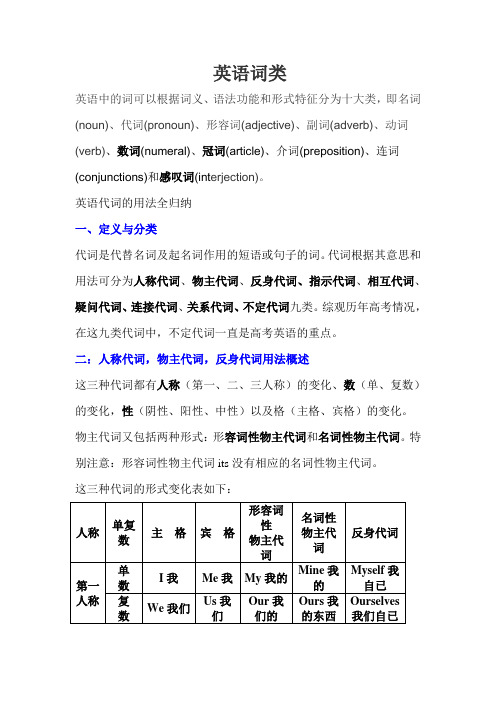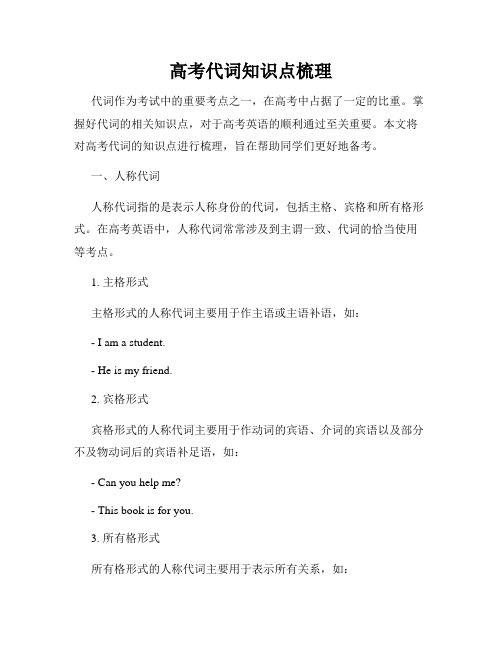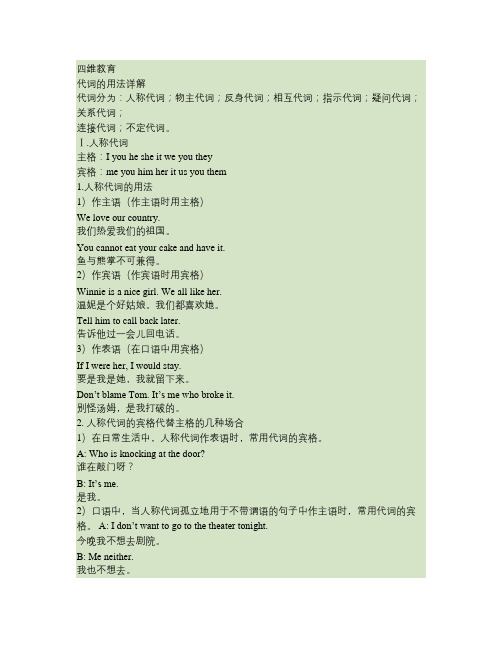高考英语代词用法总结(完整)
(完整版)英语代词的用法全归纳

英语词类英语中的词可以根据词义、语法功能和形式特征分为十大类,即名词(noun)、代词(pronoun)、形容词(adjective)、副词(adverb)、动词(verb)、数词(numeral)、冠词(article)、介词(preposition)、连词(conjunctions)和感叹词(int erjection)。
英语代词的用法全归纳一、定义与分类代词是代替名词及起名词作用的短语或句子的词。
代词根据其意思和用法可分为人称代词、物主代词、反身代词、指示代词、相互代词、疑问代词、连接代词、关系代词、不定代词九类。
综观历年高考情况,在这九类代词中,不定代词一直是高考英语的重点。
二:人称代词,物主代词,反身代词用法概述这三种代词都有人称(第一、二、三人称)的变化、数(单、复数)的变化,性(阴性、阳性、中性)以及格(主格、宾格)的变化。
物主代词又包括两种形式:形容词性物主代词和名词性物主代词。
特别注意:形容词性物主代词its没有相应的名词性物主代词。
这三种代词的形式变化表如下:三、人称代词的用法1) 定义:人称代词是用来指代人、动物或事物的代词。
它必须在人称(第一人称、第二人称、及第三人称)、数(单数、复数)以及性(阴性、阳性、中性)三方面与被指代的名词一致。
如:I am a student. Tom is a boy, and he is a student.Mary is very pretty, and she likes singing.The boys are students, and they are in the room.The doy is small. It is Tom's.2)人称代词的句法功能A) 人称代词有主格和宾语之分:主格用作主语,宾格用作宾语。
B) 人称代词的主格形式在在句中作主语和表语。
如: I like music(主语). She is a teacher.(主语)She and I are good friends(主语).Neither she nor I am student.——I saw the boys this morning.——Are you sure it was they(表语)?C) 人称代词的宾格在句子作动词的宾语,或者介词的宾语。
代词知识点总结高中

代词知识点总结高中代词是指用来代替名词或名词短语的词语,可以分为人称代词、指示代词、疑问代词、关系代词、不定代词等。
代词在句子中起着替代名词的作用,能够使句子更加简洁明了。
在高中的语法知识中,代词是一个非常重要的部分,它的正确使用对于学生们的英语学习至关重要。
下面将对代词的相关知识进行总结和归纳,希望能够帮助同学们更好地掌握代词的用法,提高语言表达的准确性和流畅性。
一、人称代词人称代词是用来表示人的称谓或指示人的词语,包括主格、宾格、和所有格等不同形式。
在英语中,人称代词的变化比较丰富,需要根据不同的语境和功能来灵活运用。
人称代词的主要形式包括:I, you, he, she, it, we, they等。
1. 主格人称代词主格人称代词用来作为主语,表示发出动作或起作用的人或物。
例如:I am a student. You are my friend.2. 宾格人称代词宾格人称代词用来作为宾语,表示受动作的人或物。
例如:She gave it to me.3. 所有格人称代词所有格人称代词用来表示所有关系,通常用来修饰名词。
例如:This is my book. That is your pen.二、指示代词指示代词是用来表示事物位置、方向、程度或数量等的代词,常见的指示代词有this, that, these, those等。
1. this和thatthis表示离说话人近的事物,that表示离说话人远的事物。
例如:This is my bag. That is her umbrella.2. these和thosethese是this的复数形式,表示离说话人近的事物;those是that的复数形式,表示离说话人远的事物。
例如:These are my shoes. Those are his socks.三、疑问代词疑问代词用来提问人、事、物的名称或数量,包括who, what, which, whose, whom等。
高考英语代词知识点总结

高考英语代词知识点总结在高考英语中,代词是一个非常重要的语法知识点。
代词在句子中可以替代名词,起到简化句子结构、避免重复的作用。
本文将从不同角度总结高考英语中的代词知识点。
一、人称代词人称代词是用来代替人的名词的词语。
在高考英语中,常见的人称代词有I、you、he、she、we、they等。
在使用人称代词时需要注意其主格和宾格的区别。
主格用于做主语或表语,而宾格则用于做动词或介词的宾语。
例如:I am a student. (主格)She is taller than me. (宾格)除了区分主格和宾格之外,人称代词还有复数形式。
例如:we代表“我们”,they代表“他们”。
二、物主代词物主代词用来表示所属关系,包括形容词性物主代词和名词性物主代词。
形容词性物主代词位于名词前面修饰名词,而名词性物主代词则作为名词的替代词使用。
例如:This is my book. (形容词性物主代词)The red one is mine. (名词性物主代词)在使用物主代词时,需要根据名词的单复数和所有格进行变化。
例如,单数名词后加's,复数名词只加'。
三、反身代词反身代词用来指示动作的承受者与动作的发出者是同一个人。
常见的反身代词有myself、yourself、himself、herself、ourselves、themselves等。
例如:He hurt himself while playing football. (他在踢足球时受伤了)另外,反身代词可以用来强调主语:I myself will finish the task. (我自己会完成这个任务)四、指示代词指示代词用来指示人或物的位置、距离和数量等信息。
常用的指示代词有this、that、these、those等。
例如:This is my bag. (这是我的包)Those are my friends. (那些是我的朋友)指示代词还可以与名词连用来修饰名词,表示特指。
代词总结知识点高中

代词总结知识点高中一、代词的分类代词可以分为人称代词、物主代词、指示代词、疑问代词、不定代词、相互代词、关系代词等几种类型。
1. 人称代词人称代词用来代替人或事物,包括主格、宾格和所有格。
主格人称代词包括I、you、he、she、it、we、they;宾格人称代词包括me、you、him、her、it、us、them;所有格人称代词包括my、your、his、her、its、our、their。
2. 物主代词物主代词用来表示所属关系,包括my、your、his、her、its、our、their等。
3. 指示代词指示代词用来指示特定的人或事物,包括this、that、these、those等。
4. 疑问代词疑问代词用来引导疑问句,包括who、whom、whose、what、which等。
5. 不定代词不定代词用来指代不特定的人或事物,包括some、any、no、every、none、all、both等。
6. 相互代词相互代词用来指代相互之间的关系,包括each other、one another等。
7. 关系代词关系代词用来引导定语从句,包括who、whom、whose、which、that等。
二、代词的用法代词在句子中有不同的用法,包括作主语、宾语、表语、定语、同位语等。
1. 作主语代词可以作为句子的主语,位于句子的主语位置,用来说明动作的执行者或者是所要讨论的人或物。
例如:I like English. (I作为主语代表“我”)2. 作宾语代词可以作为句子的宾语,位于动词后面,用来说明动作的承受者。
例如:She loves him. (him作为宾语代表“他”)3. 作定语代词可以作为名词的修饰语,位于名词前面,用来修饰名词。
例如:This is my book. (my作为定语代表“我的”)4. 作表语代词可以作为名词的补语,位于系动词后面,用来表示主语的身份、特征、状态或性质。
例如:She is a teacher. (teacher作为表语代表“教师”)5. 作同位语代词可以作为与名词的同位语,用来进一步说明名词的身份、特征、状态或性质。
(完整版)高中英语代词的用法

代词一、定义与分类代词是代替名词及起名词作用的短语或句子的词。
代词根据其意思和用法可分为人称代词、物主代词、反身代词、指示代词、相互代词、疑问代词、连接代词、关系代词、不定代词九类。
综观历年高考情况,在这九类代词中,不定代词一直是高考英语的重点。
⏹人称代词I , you ,she ,him⏹疑问代词who, whom, whose, which, what (用于引出特殊疑问句的代词)注意:what与which的用法区别:当选择的范围较明确时,用which;不明确时用what。
如:Which color do you like, red, black or white? What color is your car?⏹物主代词my 、your、hers⏹关系代词which 、that、who、whom⏹反身代词myself、yourselves注意:反身代词用于be, feel, seem, look 等后作表语表示身体或精神所处的状态。
如:I'll be myself again in no time. 我一会儿就会好的。
He doesn't feel himself today.I’m not quite myself these days. 我近来身体不大舒服。
⏹连接代词who, whom, what, which, whose, whoever, whatever, whichever主要用于引导主语从句、宾语从句和表语从句等⏹相互代词each other、one another⏹不定代词one、each、another、neither⏹指示代词this、that、those、these注意:a. 为避免重复,可用that 和those 代替前面提到的名词。
如:The playground of this school is bigger than that of that school.(that=the playground)My books are next to those of the monitor.b. 在打电话时,通常用this 指自己,用that指对方:如:Hello. This is Jim. Is that John?c. this 和that 还可用作副词,用以修饰形容词或副词,意为“这么”、“那么”,相当于so。
高考代词知识点梳理

高考代词知识点梳理代词作为考试中的重要考点之一,在高考中占据了一定的比重。
掌握好代词的相关知识点,对于高考英语的顺利通过至关重要。
本文将对高考代词的知识点进行梳理,旨在帮助同学们更好地备考。
一、人称代词人称代词指的是表示人称身份的代词,包括主格、宾格和所有格形式。
在高考英语中,人称代词常常涉及到主谓一致、代词的恰当使用等考点。
1. 主格形式主格形式的人称代词主要用于作主语或主语补语,如:- I am a student.- He is my friend.2. 宾格形式宾格形式的人称代词主要用于作动词的宾语、介词的宾语以及部分不及物动词后的宾语补足语,如:- Can you help me?- This book is for you.3. 所有格形式所有格形式的人称代词主要用于表示所有关系,如:- This is my book.- Is that your pencil?二、指示代词指示代词用于指示特定的人或物,包括近指示代词和远指示代词。
在高考中,指示代词常涉及到考生对句子结构的理解和翻译能力。
1. 近指示代词近指示代词主要用于指示距离说话者较近的人或物,如:- This is my bag.- These are my friends.2. 远指示代词远指示代词主要用于指示距离说话者较远的人或物,如:- That is his car.- Those are their houses.三、相互代词相互代词主要用于表示两个或多个人或物之间的相互关系,常见的相互代词有each other和one another。
在高考中,相互代词常常涉及到对人际关系的描述和理解。
1. each othereach other用于表示两个人之间的相互关系,如:- They love each other.- The twins look exactly like each other.2. one anotherone another用于表示两个或多个人之间的相互关系,如:- The team members often help one another.- The students learn from one another.四、不定代词不定代词用于代替不具体指称的人或物,常常涉及到复数、单数、可数、不可数等概念的区分。
高中英语代词的用法详解

四维教育代词的用法详解代词分为:人称代词;物主代词;反身代词;相互代词;指示代词;疑问代词;关系代词;连接代词;不定代词。
Ⅰ.人称代词主格:I you he she it we you they宾格:me you him her it us you them1.人称代词的用法1)作主语(作主语时用主格)We love our country.我们热爱我们的祖国。
You cannot eat your cake and have it.鱼与熊掌不可兼得。
2)作宾语(作宾语时用宾格)Winnie is a nice girl. We all like her.温妮是个好姑娘。
我们都喜欢她。
Tell him to call back later.告诉他过一会儿回电话。
3)作表语(在口语中用宾格)If I were her, I would stay.要是我是她,我就留下来。
Don’t blame Tom. It’s me who broke it.别怪汤姆,是我打破的。
2. 人称代词的宾格代替主格的几种场合1)在日常生活中,人称代词作表语时,常用代词的宾格。
A: Who is knocking at the door?谁在敲门呀?B: It’s me.是我。
2)口语中,当人称代词孤立地用于不带谓语的句子中作主语时,常用代词的宾格。
A: I don’t want to go to the theater tonight.今晚我不想去剧院。
B: Me neither.我也不想去。
A: I’d like to stay here for another week.我想在这里再呆一周。
B: Me too.我也是。
3)在带as 和than 的比较级后面,许多场合下用代词的宾格。
She knows me as well as him.她像了解他一样了解我。
He is taller than me.他比我高。
4)口语中,当人称代词用于带有强烈感情色彩的句子中作主语且其后不带宾语时,多用代词的宾格。
高考英语语法知识总结代词

高考英语语法知识总结(代词)如下:代词在近几年高考试题中的复现率为100%,每年至少测试一道题。
测试代词常用对话形式,构成特定语境,考查考生灵活运用代词的能力。
代词指代的范围、作主语时主谓一致的用法、易混不定代词的细微差别都是高考的必考点。
其中不定代词one,the one,ones与that,those,it的用法区别。
考点一、考查one(s), that, those, it的用法[考点解读]● one泛指一个人或物。其复数形式为ones。 one和the one作同位语时,如果与其同位的词语是特指,则用the one;如果是泛指,则用one,。● that指代前面提到过的名词,常有后置定语。 that的复数形式是those。 that可指代单数可数名词(= the one), 也可指代不可数名词,或指代前面提到过的一件事。● it可指代前面提到过的一个名词,如例7;指代一件事,如例8;指代不明性别的婴儿或不明确的人,也可指代时间、天气、距离等0。二、考查all, both, either, neither, none, no one的用法[考点解读]● both表示“两个人或物都”,具有肯定含义; either表示“两者中任何一个”,如例13; neither表示“两者都不”。● all表示“全部”,指三者或三者以上的人或物,;all也可笼统地表示“一切,所有”, none表示“三者或三者以上的人或物的全部否定”,在与of连用或回答how many/much的提问时只能用none, no one表示“没有一个人”,三、考查another, the other, others, the others的用法[考点解读]● another泛指三个或三个以上的人或物中不确定的另一个,如例19。another还可以作形容词,表示“另一个的”● the other指已知的两个人或物中的另一个● others和“other + 名词”均泛指“别的人或物”● the others指“一定范围内其余的人或物”,如例23。如果被指代的名词是不可数名词,则用the rest替代,四、考查(a) little, (a) few, some, any的用法[考点解读]● few和little可用作代词和形容词。 few和a few可以修饰或代替可数名词复数。 few有否定含义, a few有肯定含义, little和a little可以修饰或代替不可数名词。 little有否定含义, a little含肯定含义,。● some和any表示“一些”,可用作代词和形容词。 some用于肯定句,如例31; any用于否定句、疑问句和条件句中, some也可用于疑问句,如例32和例33; any也可用于肯定陈述句中,表示“任何一个”,五、考查something, somebody, someone, anything, anybody, anyone, nothing, nobody, everything, everybody的用法及它们与else的搭配[考点解读]● 由some和any构成的不定代词的用法和some和any的用法基本一致。● nothing和nobody/no one表示全部否定。● 无论在肯定句、否定句还是疑问句中, everything和everyone (everybody) 都表示“全部,所有”。● 不定代词后跟else时,表示“另外的,其他的”;形容词修饰something/anything/nothing时,应置于不定代词之后。以上不定代词连写时,不和of连用,every one可和of连用。【高考英语代词语法知识精选试题】名校模拟题及其答案1. I agree with most of what you said, but I don’t agree with______.A. everythingB. anythingC. somethingD. nothing2. “What do you think of them?” “I don’t know _____ is better, so I’ve taken _____ of them.”A. what, bothB. what, noneC. which, both C. which, none3. “Would you like a cup of coffee or a glass of beer?” “____ will do, but milk is _____ popular with me.”A. Neither, notB. Both, moreC. Either, the mostD. All, the most4. I read about it in some book or other, does it matter _____ it was?A. whereB. whatC. howD. which5“Who told you?” “Oh, somebody or other, I’ve forgotten_____.”A. whatB. whenC. whichD. who6.Some of the students were late for the meeting, but I can’t remember _____.A. whatB. whenC. whichD. whom7. These trousers are dirty and wet —I’ll change into my_____.A. anotherB. trousersC. othersD. other8. Her lecture was hard to follow because she kept jumping from one subject to _____.A. otherB. the otherC. the othersD. another9. There are four bedrooms, ______ with its own bathroom.A. allB. eachC. everyD. either10. “It’s said that he is a wise leader.” “Oh, no, he is_____ but a wise leader.”A. anythingB. anyoneC. anybodyD. anywhere11.I didn’t make clear when and where the sports meet would be held.A.this B that C it D one12 To tell you the truth..really don't like when people talk with you with their eyes stating into the sky.A.which B that C it D.what13.一Which one can I take?一You can take of them;I’ll keep none.A.bothB.anyC.eitherD.all14.一Which coat would you prefer.sir?一I’ll take ,to have n change so metimes.A.allthemB.them dlC.both them D them b0Ih15.The movie is boring;it is,in fact,rather exeiting and interestingA anything butB nothing butC no moreD all but16 Alan sold most of his belongings.He has hardly left in the houseA.everythingB.anythingC.nothing D something17.I have been lived in Shanghai for two years.butI haven’t covered of the cityA.anythingB.much C many D plenty18.She kept looking behind to see if she was being followedA her B.herself C.her own D.she19.All of us want very much to see these recommended movies,especially you referred to jusl now.A asB whichC the oneD that20.If a studem can make what has been learned whether in class of from social practice ,he will make steady progress.A heB himC himselfD his21.一Do you want tea or coffee?一 really don't mindA.None B Neither C Either D All22.The manager believes prices will not rise by more than four percent.A.any other B the other C another D other23.The manager was very angry,for he had sent his business partner two thousand machines yesterdy,half of unqualified.A.whom B what C them D.which24一Did you visit many places while you were in Canada?一Yes,A.afew quite B only few C.only afew D quite few25 In somecountries, is callede quality does not really mean equal rights for all peopleA thatB whatC whichD how26一May I have a glass of beer.please?一Beer?Sorry,there is left,but would you mind having,some juice instead?A none B.no one C nothing D few27.一When can we goto visit you?一Anytime you feel likeA.one B it C so D thal28 We need a more capable leader, with strong will as well as good humour.A who B.that C.one D.which29.The number 2008 is a special number, I think,that will be remembered hy the Chinese forever.A.which B what C one D.it30.一How do you like his wife?一She is like a good housekeeper,for the children's room is always in a terrible mess.A SomebodyB nobodyC something D.nothing——答案与解析——1【解析】此题应选 A,注意前文的 I agree with most of what you said(我同意你说的大部分内容),其后的not 与 everything 构成部分否定,意为“不是所有的都同意”,前后两部分用转折连词 but 连接,语气通顺、连贯。
- 1、下载文档前请自行甄别文档内容的完整性,平台不提供额外的编辑、内容补充、找答案等附加服务。
- 2、"仅部分预览"的文档,不可在线预览部分如存在完整性等问题,可反馈申请退款(可完整预览的文档不适用该条件!)。
- 3、如文档侵犯您的权益,请联系客服反馈,我们会尽快为您处理(人工客服工作时间:9:00-18:30)。
高考英语代词用法总结(完整)一、单项选择代词1.They have done much of the work; when will ________ be finished?A.the rest B.the otherC.another D.the others【答案】A【解析】答案:A代词用法。
the rest可指代前面的不可数名词work, 而其它三项均不可指代不可数名词。
2.---- “Lady GaGa” is a real legend!---- Absolutely. She is a big hit in the sales of her albums. In addition, _______ of the singers around the world can match her in unique taste in haircuts and clothes.A.nothing B.none C.nobody D.no one【答案】B【解析】世界上所有的歌手在发型和穿着的独特品位上不能与她相比,none三者以上都不,nothing常回答what ,nobody no one常回答who。
3.—There is still a copy of the book in the library.Will you go and borrow _____?—No.I’d rather buy ______ in the bookstore.A.one; one B.one; it C.it; one D.it; it【答案】C【解析】指代物体时,one指代同名异物,it指代同名同物,根据题意选C。
你要去买它吗?-不,我宁愿去书店买一个。
4.--Do you know the 3G mobile phone will come into the market soon?--Really? It is said to be superior ____any other model. I can’t wait to buy ____.A.to ; one B.than; one C.to ; it D.than; it【答案】A【解析】短语搭配be superior to 比…高级;one相当于a phone。
“你知道吗3G手机很快会进入市场”“真的吗?据说比其他类型的手机高级我迫不及待的想买一部”。
选A5.The restaurant is full, so we have to look for ______ one.A.other B.the otherC.the second D.another【答案】D【解析】试题分析:句意:这个饭店满了,我们得再找一家。
A. other其他的;B. the other二者中的另一个;C. the second第二个;D. another三者以上的另一个。
故选D。
考点:考查代词。
6.Everyone may depend on ______ won’t happen again with these reassuring measures.A.it that it B.that it C.that D.it【答案】A【解析】试题分析:句意:每个人都可以相信,有了这些可靠的措施这种事不会再发生了。
句中第一个it是形式宾语,that引导宾语从句后面是真正的宾语。
故选A.考点:考查宾语从句。
7.– ________ of us think the English examination was difficult.–But I still don’t think ________ could pass it.A.All, everybody B.None, anybodyC.All, anybody D.None, everybody【答案】D【解析】试题分析:考查部分否定和全部否定。
none,nobody,no通常表示全部否定;否定词和all,every,each连用,表示部分否定。
句意:—我们中没有一个人认为这次英语测试难。
—但是我仍然不是所有人都能通过这次考试。
故D正确。
【名师点睛】英语中的部分否定(即不完全否定)有如下一些表示方法:一、 all 的否定式:not all…(或:all…not)表示"并非都……"、"不是所有的都……"例如:Not all men can be masters. (=" All" men cannot be masters.) 并非人人都能当头头。
Not all bamboo grows tall. 并非所有的竹子都会长得很高。
二、 both 的否定式:not…both (或:both… not) "并非两个……都……" 例如:I don't want both the books. 我不是两本书都要。
Both (the) windows are not open. 两扇窗子并不都开着。
三、every…的否定式:"不是每……都……" 例如:Not every book is educative. (或:Every book is not educative.) 不是每本书都有教育意义的。
Not everyone likes this book. 并非人人都喜欢这本书。
This flower is not seen everywhere. 这花并不是随处可见的。
四、 always的否定式:"并非总是(并非一直)……" 例如:He is not always so sad. 他并不是一直都这样悲伤。
五、 entirely, altogether, completely 和quite 的否定式,"不完全……","并非完全……" 例如:The businessman is never to be entirely trusted. 不可以完全信任商人。
He felt not altogether satisfied. 他并不完全满意。
I don't agree completely. 我并不完全同意。
What he did was not quite proper. 他做的不十分妥当。
六、 all the time 的否定式:"并非一直……"、"未必老是……"例如: A foolish man doesn't make a mistake all the time. 笨人未必老是犯错误。
七、not…and…的否定式,被否定的往往是and后面的那一部分。
例如: He did not speak clearly and correctly. 他讲得清楚但不正确?This film is not interesting and instructive. 这部电影有趣但无教育意义。
She cannot sing and dance. 她会唱歌但不会跳舞。
如果将and 换成or,not 对其后面的两部分就全盘否定了。
He did not speak clearly or correctly. 他讲的既不清楚也不正确。
如要对上述的all, both, every, always, 以及entirely, altogether, completely, quite 和 all the time 等词作完全否定,那就分别要用与之相对应的全否定词,如no, none, neither, no one, never, not (never)… at all 等。
All of them can do it.--- None of them can do it.Both are good.---Neither is good.Everybody likes it. ---Nobody likes it.He is always late. --- He is never late.We don't trust them entirely. --- We never trust them at all.He was here all the time. --- He was never here.考点:考查部分否定和全部否定8.To British people, Canadians may sound American; To Americans, they may sound British. Canadians themselves insist on not being identified with _________.A.neither B.both C.any D.either【答案】D【解析】试题分析:本题考查代词。
A. neither也不;B. both 两个都;C. any任何; D. either两者之一。
not…either两者都不。
故选D。
【知识拓展】1. neither两者都不;neither---nor---既不---也不2. both 两个都;both---and---两个都---3. either两者之一;either---or---或者---或者---。
考点:考查代词9.--Have you heard about Apple iPhone 6s?--Sure.It is a hit these days.I am thinking about getting _____.A.one B.themC.that D.it【答案】A【解析】试题分析:考查代词用法。
one 是泛指,同名异物,相当于a/an + 名词;that 是特指,同名异物,相当于the + 名词;it 同名同物。
句意:——你听说过苹果6s吗?——当然了,这些日子非常流行。
我正考虑买一个呢。
one在这里相当于an Apple iPhone 4,所以选A。
考点:考查代词用法10.He knew the files could be of help to took over the job.A.anyone B.someone C.whoever D.who【答案】C【解析】这是一个复合句,He knew是主谓,后面the files could be of help to whoever took over the job.是宾语从句(省略了that)。
这个宾语从句里面又套有一个宾语从句whoever took over the job11.I agree with most of what you said,but I don't agree with _____.A.everything B.anythingC.something D.nothing【答案】A【解析】试题分析:考查不定代词的用法。
